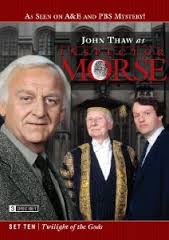
THE TWILIGHT OF THE GODS
UK, 1993, 100 minutes, Colour.
John Thaw, Kevin Wakley, Robert Hardy, Sheila Gish, John Gielgud, John Bluthal, Rachel Weisz, Alan Corduner.
Directed by Herbert Wise.
The Twilight of the Gods is one of the last of the Inspector Morse series. It has a strong Oxford atmosphere, especially with the academic world, John Gielgud at age 89 portraying the Chancellor of the University. Robert Hardy has a meaty role as a benefactor of the University, an alleged victim of the concentration camps but revealed as one of the guards and torturers. He becomes the target of a Nazi hunter, played by John Bluthal, who attempts to shoot Hardy during the academic procession but accidentally wounds a Welsh opera singer, played with vigour and some venom by Sheila Gish. there is also an early appearance by Rachel Weisz.
1. The popularity of the long-running series? Television movies? With style? The popularity of Morse and his personality, enigmatic and mannered style? The personality of Lewis? Their relationship? The solving of the crimes? Intricacy of the plot? The psychological dimensions, the mystery and clues? Police work and solving the mysteries with their own abilities? The work of Colin Dexter?
2. The Oxford settings, the city and landscapes, the cityscapes, the buildings? Comments about Oxford and Oxford society? The ironies about Oxford and the dons? The university city? Ordinary people? Their interconnections? So much beauty – and so much crime?
3. The quality of the mystery, character-driven? Sufficient information, sufficient clues? The exploration of character and clues?
4. John Thaw as Morse, his personality, the changes over the years, yet remaining the same? The mystery of his name? His crusty manner, the bachelor (but romantic at times)? His own authority – exercised over Lewis – and his reaction to authorities? Promotion or not? The changing of his attitudes towards Lewis, bossing him, patronising him about education and culture? The issue of music? Drinking ale? His car? Quietly at home, at work? With Lewis, understanding the situations and characters, the deductions? His being a good listener – but critical?
5. The contrast with Lewis, the family man, the ordinary policeman, education and lack of education, his being put down by Morse – but enjoying his comeuppance now and again? Music and his ignorance? The first reactions, Lewis being patient? His admiration for Morse, having to do so much leg work, to formulate hypotheses? Working under pressure? Collaborator and partner of Morse?
6. The police authorities in Oxford? The medical examiners – and Morse and his attitude towards the female authorities? Sexist and patronising? Changing?
7. The quality of the film as a crime thriller, a thriller with intelligence and demands on the audience?
8. The introduction to the crime, the credits, the background in Oxford, beyond?
9. The range of personalities, motives? Truth and concealment? Jealousies? Deceits and angers? The academic and religious backgrounds?
10. The introduction to Andrew Bent? The design for the college, Indian influence? The disdain of academics? His getting an honorary doctrine? His character, his being impatient, insulting people? His attitude towards his secretary? His daughter and her flat, the missing document, or attitude towards her father? Her mother, a strained relationship with her husband? The missing son, in South America, his father’s view that he was being denounced, but the son working for environmental issues? The using contacts tracking down?
11. Morse, the concert, lesson, his being rapt, in a playful, joyful mood for the rest of the film? Lewis’ reaction? The banter between the two?
12. The body and the river, identified as a journalist, freelance, critical of Baydon, Baydon and his henchman, dressed as a clergyman, ransacking the daughter’s flat, running away when a masked as the killer?
13. The diva, her performance, a critical attitude towards the singers? From Wales, travelling with her sister, the clashes and tantrums, the revelation about the singer and liking for younger men, not marrying, career, entourage, the diverse personalities, length of time with the singer, stylist, costumes, voice coach, assistants?
14. The disappearance of the sister, suspicions, going off with her boyfriend, the return?
15. The Chancellor, his wife and suggestions for his speech, his dislike of Baydon, his Welsh assistant, his sarcasm? The procession, pomposity, not hearing the shot? Being held for questioning? Wanting lunch? Talking with Morse? The afternoon tea and his speech? The Welsh assistant, his comments, translating the note?
16. The investigator, in the library, shooting, hiding the gun, hitting the singer, missing Baydon? His confession, wanting to proclaim Baydon’s guilt in the court, protected by privilege?
17. Baydon, his secretary, his appointments, interviews with Morse, wearing his academic gown, the issue of the doctorate, travelling by helicopter, his secretary with Morse and giving the information his being unmasked, his venomous response?
18. The effect on the family, the daughter, the wife?
19. Morse, the discovery of truth about the singer, his admiration, sending the flowers, but his distaste for her behaviour?
20. Lewis, the interview with the entourage?
21. A satisfactory murder mystery, the concentration camp overtones, the focus on music and opera?